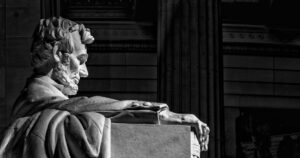Image Source: Brendan Campbell/News21; The Philadelphia Inquirer
Who we are in the world very much depends on our perspective. We understand the complex and often confounding reasons that we do what we do. To ourselves, we make perfect sense. But to others we’re a bit mad. Humans are strange creatures, and we do so much that doesn’t align with the explainable. So our self-justifications are often incomprehensible outside of our own heads.
The same thing applies for groups. We deal with the same sort of cognitive dissonance as a group that we do as an individual. And we bridge those gaps with strained logic, slanted towards our worldview, and if it does the job, relieving our cognitive tension, we can move on.
This seems to be the process that brings us to the point where our realities no longer bear much overlap with one another. Where the meaning of an event or an idea can be completely opposite depending on our perspective within the multiverse.
The right and the left seem to be occupying these disparate universes, with each group believing the other to be harboring domestic terrorists, and finding themselves continually asked to denounce a phenomenon that they feel they have multiple times.
Go look at the first presidential debate, and watch this happen. (I’ll go through this in detail, because the words matter.) Chris Wallace asks the president “to condemn white supremacists and militia groups,” and Trump responds, “Sure.” With that commitment, Wallace presses the case.
“And to say that they need to stand down, and not add to the violence in a number of these cities, as we saw in Kenosha, as we’ve seen in Portland.” Notice that Trump is nodding and saying “Sure” repeatedly as Wallace asks it.
When Wallace is done, Trump responds, “Sure, I’m willing to do it,” but he immediately pivots back to Antifa. A statement that sounds utterly perfunctory and inadequate to blues seems to be to Trump an agreement that white supremacists should be condemned. But it’s no surprise that the others on stage with the president feel that his answer is inadequate, so we end up with a chaotic exchange that includes the commands, “Then do it, sir,” and, “Say it, do it, say it” coming from in front of and beside him. I imagine he feels like he’s under attack at this point. Even so, he does seem intent on actually going through with a more formal denunciation when pressed.
“You want to call them… What do you want to call them?” he asks. “Give me a name, give me a name, go ahead. Who would you like me to condemn? Who?”
Wallace and Biden start once again calling things out simultaneously, Wallace offering up “white supremacists and right-wing militias,” and Biden calling out “white supremacists” as well. Seeing that this one’s been said, Biden wants to be creative with his next guess, and throws out one that hasn’t been mentioned yet: “Proud Boys.” Trump grabs Biden’s lifeline—which would allow him to focus his condemnation on a smaller group—but it’s very plain to see, from the direction of the exchange, Trump’s intention to tell the Proud Boys not to stir up trouble.
Trump’s next words, however, are a product of previous elements of the conversation and his own life story. Bear with me on this. With the Proud Boys as his target, he’s determined to get full credit for his answer so he can again try to move on.
Chris Wallace’s demand that Trump “say that they need to stand down” has stuck in the president’s head, a crystal-clear request that he can address with a pro forma sentence. The problem is, he’s actually forgotten the exact phrase that Wallace used.
Trump was once a student in a military academy, and he also happens to be the current commander-in-chief of the U.S. military. Still, he hasn’t spent any time serving in that military, which would have made the term “stand down” second nature. So when it comes time to recall what Wallace has asked him to say, the word “stand” is the one thing he knows for sure.
“Proud Boys, stand back and stand by.” On the word “back,” you can just hear in the b sound that he’s changed his mind right as he starts the word and goes with a different one. But he’s trying to cover his bases, so he offers up the word he was perhaps originally going to use as well: “by.” There is actually little doubt in my mind that the president is at this point legitimately trying to do exactly what Chris Wallace has asked of him, so he can once again pivot the attention back to Antifa. And the very next word is the confirmation.
“But I’ll tell you what, I’ll tell you what, somebody’s got to do something about Antifa and the left, because this is not a right-wing problem. This is a left-wing problem.”
With this “But,” Trump indicates that what preceded it was conciliatory, that he believes it was the condemnation that Wallace had asked for. The word “but” allows him to essentially say, See, I told the Proud Boys to back off, now let’s go back to asking Joe to condemn Antifa.
In my mind, this one exchange illustrates the sheer absurdity of our current political situation. Each side believes the other to be dodging responsibility to condemn violent groups, and the one who actually thought he was doing so is also the one who inadvertently gave the group he was “condemning” the perfect quote to put on their t-shirts.
It’s a reinforcement of how important words can be, the sheer scale of consequence from a simple swap of prepositions. President Trump seems to assign little weight to verbal precision, and it’s one of the reasons he can also seem so divisive. The president’s habits stem from his life before his election, and as a deal-maker he thrived amid ambiguity. Trump would avoid being pinned down, giving him an advantage when it came to his business commitments.
But a president’s words cannot be weightless, especially at a time when each faction is eager to interpret them in a way that supports their preconceptions. And the ambiguity in which Trump thrives creates an environment rich with fodder for such willful interpretation.
It’s also vital to note that Trump stirs up trouble when he tells his supporters to “go into the polls and watch very carefully” for election irregularities, since once again it leaves things open to interpretation, encouraging people to deputize themselves as “poll watchers” rather than going through the appropriate steps for each state’s poll-watching regulations, which prevent chaos.
And as alt-right groups, including the Proud Boys, seem to be gearing up for poll-watching efforts, there is legitimate fear that they will be there with AR-15s, especially in swing states like North Carolina, Pennsylvania, Virginia and Wisconsin, which have no laws against this (Michigan has just banned open carry at or near polling locations).
One of the frustrations I hear expressed fairly often seems to be shared equally by people regardless of their political leanings. The other side, they say, refuses to acknowledge facts, leaning instead on their own emotional interpretation of reality. I always push back.
As social animals, emotion is ever-present in our interactions. I’ve heard several people declare that they are uniquely impervious to the human tendency toward emotionally motivated reasoning. But I tend to conclude instead that this person is the opposite of unique. They’re blind to the impact of their own biases, just like the rest of us.
While I don’t know if I’d go as far as full-blown postmodernism in rejecting the objective nature of reality, it remains valid that reality includes our experiences, and therefore reality is to some extent what we make of it in our minds.
In this “golden age of television,” as with many other present-day arts, there’s an increased appreciation for the value of perspective, and two shows in particular in recent months have reinforced this sense for me.
If you haven’t yet seen Cobra Kai, I strongly recommend checking out this present-day TV continuation of the classic Karate Kid movies. There are few more compelling arguments for intellectual humility that I’ve seen. Viewing the events of the movies from the perspective of “Sweep the Leg” Johnny changes things radically, driving home that our human vantage point is far from omniscient. We must consider that our aggressors also see us as such. The wrongs that we ourselves see are no doubt true wrongs, despite their not seeing them. And there are wrongs that we do not see, but that does not invalidate them.
I discussed with my friend and colleague, Paul Norris, a deep red, the way that those who are involved in violence in the streets see their role in things, including leftist Antifa and right-wing militias.
“I think we’re knocking on the door of something real,” he said as we recognized the competing narratives that seemed to feed off of plenty of compelling evidence on each side. “We all think we’re Miyagi-do. That we’re ready, but will not strike the first blow. Miyagi-do is not non-violent, but is seeks non-violence through the capacity for violence.”
“And,” he added, “we think the other side is Cobra Kai.”
We’ve told ourselves that we won’t strike first, but we will be ready to strike when stricken. But that sets up hair triggers that are sensitive to the slightest slight, plunging us inexorably toward civil war.
If you’re really going for a full dose of humility, you need to watch The Vow. The HBO documentary series chronicles the development of NXIVM (pronounced Nexium), a self-improvement program that turned out to be a cult of sexual enslavement. To my eye, the group of defectors that the doc focuses on are genuinely sympathetic characters, just good people who went in a bad direction.
The most powerful moment of the series thus far came in the recent episode “The Wound.” After hearing that her friend once slept on the floor next to her husband as “penance,” actress Catherine Oxenberg starts to mock her, saying she’ll “remember not to become part of this community.”
Mark Vicente sees the utter shame in his wife’s reaction to the memory, though, and delivers a searing soliloquy:
“It’s so easy to shame, you know? We’re not at the point we can make fun of these things. It’s not funny that she made a bed on the floor. It’s not funny for me. Cause I’m the guy that sat there and thought, Well I guess it’s a good idea, I guess… What am I, f—in’ stupid? Of course I’m f—in’ stupid. I know that already…
“We’re not f—ed-up, strange monsters that made bad choices our whole life. We didn’t join a cult. Nobody joins a cult. Nobody. They join a good thing and then they realize they were f—ed.”
It’s a natural reaction to judge those who have made retrospectively awful decisions. It’s much harder to see the potential for those decisions within ourselves.
As we approach this election gripped with fear that we will fall victim to the aggression and machinations of our fellow citizens, we must not lose ourselves in the storyline, becoming the very dojo we thought we’d been standing up to.




